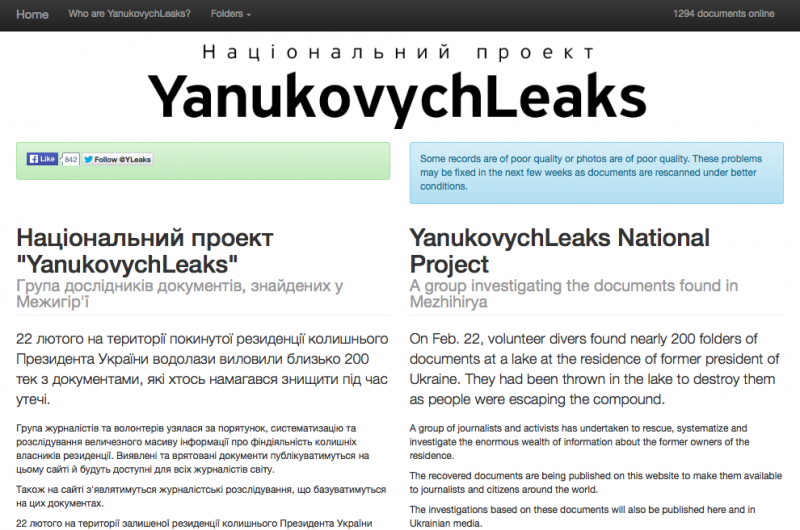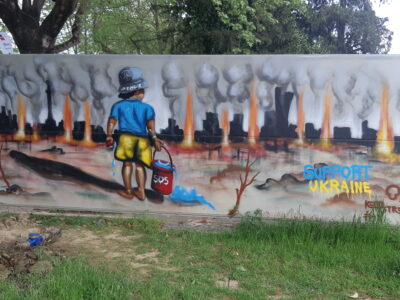
YanukovychLeaks.org, a new website created by Ukrainian journalists to publish documents that were found in Victor Yanukovych's residence. Many of them document evidence of massive corruption of the regime.
This post is part of our Special Coverage Ukraine's #Euromaidan Protests.
After former Ukrainian President Victor Yanukovych fled Kiev in the wake of escalating protests, regime violence and major reshuffles in Parliament, one of the things he left behind was his massive, opulent residence on the outskirts of the capital, Mezhyhirya. The palatial estate soon opened its doors to protesters, journalists and ordinary citizens, who wanted to see for themselves how their President had lived.
But among the many grandiose buildings and signs of an excessive lifestyle (a zoo! a galleon ship! a golf course!), journalists and activists found a more important treasure – reams of paperwork on the estate, blacklists of journalists and activists, and financial records. Some of them were half-burned, others dumped in the water of the Dnieper river and the Kyiv Sea on the edge of the land.
Journalist Oleksandr Aronets, now famous for his endless live streams from Euromaidan, was one of the first to spot the papers in the water:
Документи просто плавають у Дніпрі! pic.twitter.com/ANhKGVXFcy
— Олександр Аронець (@aronets) February 22, 2014
The documents are just floating in the Dniepro!
Katya Gorchinskaya, a journalist for local English news outlet Kyiv Post, tweeted about how the documents were rescued:
diver about to dive into freezing Kyiv Sea to keep looking for Yanukovych files in #Mezhyhirya pic.twitter.com/PajSkwj2rx
— Katya Gorchinskaya (@kgorchinskaya) February 24, 2014
As the documents were rescued and set to dry, a group of journalists came together swiftly to start photographing and cataloging the newly discovered information, to preserve it for future investigations. Katya Gorchinskaya posted this photo of some of the work:
sorting thru Mezhyhirya files. day 2. @natasedletska @annababinets @MichaelShchur @akymenko_y #Ukraine pic.twitter.com/3fuCmYbbLK
— Katya Gorchinskaya (@kgorchinskaya) February 24, 2014
Later, Sergii Leshchenko, a journalist from Ukrainska Pravda, known for his investigations of Yanukovych's property, including Mezhyhirya, posted a photo of more documents drying in the sauna on the premises:
Те, що відбувається зараз в Межигір'ї – це унікальний навіть за світовими мірками проект. Кілька десятків журналістів копіюють тисячі сторінок знайдених тут доказів корумпованого нутра Януковича. На фото – включена сауна будинку для гостей Януковича, де сушаться виловлені в Київському морі документи.
What is happening now in Mezhyhirya is a project unique even by world standards. Several dozen journalists are copying thousands of pages of evidence of the corrupt nature of Yanukovych found here. This is a photo of a working sauna in Yanukovych's guest house, where the documents fished out of the Kyiv Sea are drying out.
As the journalists worked, they posted select findings on social networks – like these outrageous finds from Katya Gorchinskaya and Christopher Miller of Kyiv Post:
Jun 24,2009 Yanukovych's game-keeper spent Hr7,660 on medical aid for fish in #Mezhyhirya. hope they r well pic.twitter.com/AxujtuUqy3
— Katya Gorchinskaya (@kgorchinskaya) February 22, 2014
“Mezhyhirya problems: out of control deer devour lawn.” Pic via Denys Bigus https://t.co/DQk2vBWX7j #YanukovychLeaks pic.twitter.com/R0bbh8kiKU
— Christopher Miller (@ChristopherJM) February 26, 2014
A group of journalists from English-language Ukrainian newspaper Kyiv Post, Ukrainska Pravda and several other media realized that the treasure trove they were looking at needed to be preserved at all costs – so they decided to cooperate in the documentation, preservation and cataloging of everything – and to report later.
They also cooperated with the Organized Crime and Corruption Reporting Project (OCCRP), a consortium of investigative centers from Europe to Central Asia. The result of their quick thinking is a website called YanukovychLeaks, which currently houses the growing collection of photos and scans of the documents found at Yanukovych's estate. Katya Gorchinskaya tweeted happily about the new arrangement:
documents fished out in river by #Mezhyhirya are going up here. http://t.co/0nwitdoRWo proud to have been part of the initial recovery team
— Katya Gorchinskaya (@kgorchinskaya) February 25, 2014
Local and international journalists also expressed their excitement at the new website. Maxim Eristavi, journalist and editor of a local radio station, thought the site would be popular:
In revolutionary Ukraine that's the hottest place on the Web right now http://t.co/0IqVobW1q6 #yanukovychleaks
— Maxim Eristavi (@MaximEristavi) February 25, 2014
Global Investigative Journalism Network also tweeted about YanukovychLeaks and reported in-depth on how the Ukrainian initiative came together:
How journalists in #Ukraine fished out documents from a lake #Yanukovychleaks http://t.co/u0hDN72srJ pic.twitter.com/I7O2dEKNDh
— GIJN (@gijn) February 25, 2014
The reporters soon learned that if the waterlogged piles were not separated and dried, they would turn into a pasty clump that could never be rescued. The team took over a boat shed the first night and then the next day moved to an opulent guest house on the grounds to lay out more documents. It became their headquarters. A sign outside reads “Journalism Investigation in Process – Do Not Disturb.”
— from GIJN piece “YanukovychLeaks: How Ukraine Journalists Are Making History”
New York Times The Lede blog also ran a story about the project:
Ukrainian Journalists Launch YanukovychLeaks http://t.co/rBKU16hy6g
— NYTimes Lede Blog (@thelede) February 25, 2014
On February 25, a member of the YanukovychLeaks team, Natalie Sedletska of RadioLiberty, reported on the massive traffic to the new website:
1.5 million hits reached #yanukovychleaks
— Natalie Sedletska (@natasedletska) February 25, 2014
Besides the main website, YanukovychLeaks.org, the team also created a Facebook page, inviting other journalists and citizens to collaborate and follow their work.




1 comment